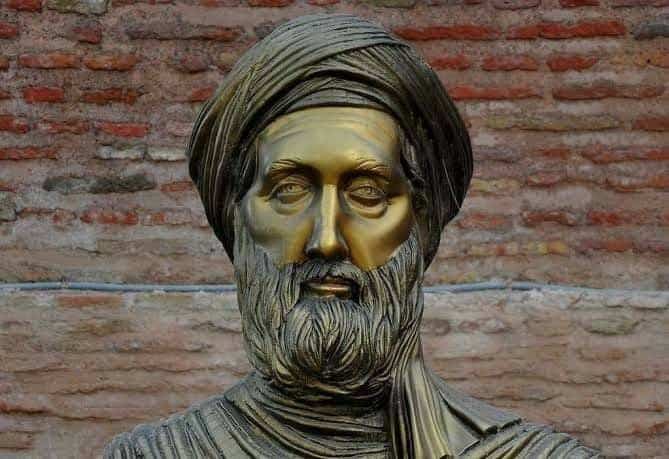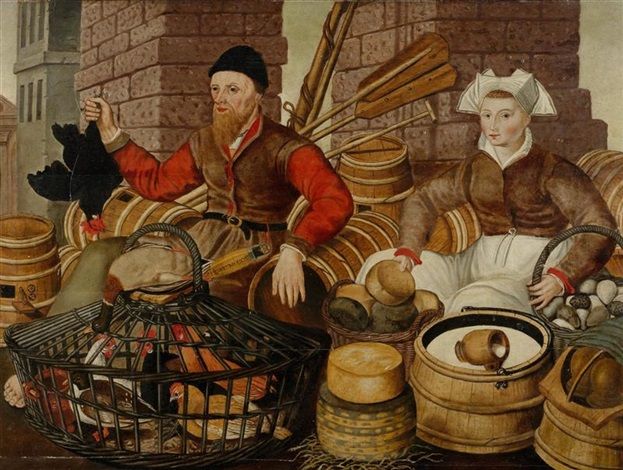Muqadimmah Ibn Khaldun and Kitab Al-Ibar

Statue of Ibn Khaldun
Muqadimmah and Kitab al-Ibar:
Muqadimmah is an Arabic word that means prolegomena, the term Muqadimmah is derived from the root of Qadāma. Qadāma means to go/come before or to precede and the word Muqadimmah and Muqadammah are grammatically acceptable. Usually, prolegomena or an introduction part in most writings is designed for an overview of the whole work. But Muqadimmah Ibn Khaldun is a lengthier and more exhaustive work, as compared to any other common writings. It is a basic overview of Ibn Khaldun’s book on history namely Diwan al- Mubtada.
However, many other Muslim scholars have also provided lengthy prolegomena, for instance, Al Ghazali(450-505AH) Maqāsīd al-Falasīfa, al-Shahrāstanī(479-548AH) Al-Milal wa al- Nihal and Ibn Hajar Asqalānī(773-852AH) Hady al-Sari Muqadimmah Fath al-Bari.
Muqadimmah was prepared along with his book of history. According to his autobiography when he was living at Qalah Ibn Salamah, away from the complicated political turmoil of Maghrib, he worked on his Kitab al bar and al-Muqadimmah. Kitab al-Ibar completed it in four years whereby Muqadimmah completed it in Five months. Interestingly, he says that the idea of writing Muqadimmah was strange (al-ghareeb).
Purpose of Writing Muqadimmah
Ibn Khaldun mentions on the last page of his Muqadimmah that in the middle of the year 779 (November 1377);
I completed the draft of this work before correction and revision in the period of five months. When I revised this book, I added the history of various nations in this book. Furthermore, he says knowledge comes only from the strong and wise God.
Muqadimmah is the first volume of his Kitab al- ibar, Ibn Khaldun explains the purpose of writing the Muqadimmah in the early pages of his book. He confesses that he composed his own history book due to four reasons, first, problematic facts in previous books by different historians like al-Tabari, al-Mas’udi and al- Waqidi. Second, new order and arrangements of historical facts. Third new focuses on the history of Arabs and Berbers till Ibn Khaldun’s time. And the fourth one is a new observation on civilization, human social organization, urbanization, and the building of dynasties.
Ibn Khaldun also states, that when he was writing Muqadimmah his only aim was to focus only on the history of Maghrib but later on he decided to highlight the general history of the whole of humankind. He used his firsthand knowledge of politics to formulate many of his ideas in Muqadimmah. Khaldun discusses a variety of topics and summarized almost every field of knowledge including natural and social sciences. He wrote about numerology, astrology, and astronomy; and dealt with alchemy and magic in a scientific method. Muqadimmah is like an encyclopedia but based on brilliant ideas. Ibn Khaldun’s work is based on contemplation, thinking, and observation. He was not a scholar of that kind who just sit down and write, yet he was a scholar in the field.
The subject of Discussion and Methodology
Muqadimmah consists of human society, nomadic and savage people, states, spiritual powers, political ranks, sedentary societies, and cities. His discussions on tribal societies and social forces are the most important as well as an interesting part of his Muqadimmah.
Probably, Ibn Khaldun was well aware that he had discovered something very unique and new, that history is controlled by social forces that take place. These social forces can explain the rise and fall of dynasties which is indeed the rise and fall of civilizations. He explained his theory of umrān science with examples from his multivolume history.
He basically applied the empirical method of natural sciences to the social sciences. His approach was very unique, as compared to other historians of the medieval ages. He looks at the empirical facts to formulate a theoretical structure, and then he tests the theoretical structure against the empirical factors.
Ibn Khaldun’s History is not descriptive or genealogical nor does it defend a specific civilization, rather than he searches for the causes behind the historical events and movements. Ibn Khaldun elaborates on the purpose of his Tarikh or book of history which is a multi-volume book.
The main motive was to highlight the history of Maghrib which was not completed by previous historians. Kitab al- ibar or book of lessons consists of three parts, the first part is Muqadimmah, and the second part discusses the history of Greeks, Persians, Romans, Goths, Spaniards, Portuguese, Basques, French, Turks, and Mongols. This attempt by Ibn Khaldun made a complete description of world history. The third part is the most valuable part of his history which previous historians did not consider. Here Ibn Khaldun gives a piece of excellent information on the history of Berbers.
Walter. J. Fischel states; that the seven-volume Kitab al- ibar or book of lessons is considered the best socio-historical work of medieval Islam.
To Ibn Khaldun history is a widely accepted discipline both among the rulers and common people. The learned and ignorant both are able to understand it. He says history is the search for the truth regarding past events.
Ibn Khaldun, actually compiled a scientific history or academic history, before him, it was based on just reports. Robert Flint states in his “History of the Philosophy of History”:
Ibn Khaldun is the first man who studied history as a science.
Ibn Khaldun is considered by many scholars a forerunner in the field of historiography. The unique component of his history is the original ideas of Ibn Khaldun on matters related to civilizations, human social organizations, and urbanization. These ideas are usually discussed under his so-called science of umrān. Ilm al- umrān is a brainchild of Ibn Khaldun. He focuses on civilizations, human social organizations, urbanizations, and the formulation of dynasties under his conception of ilm al- umrān.
Sources
Melvyn Bragg, “Ibn Khaldun (in Our Time) BBC Podcasts,” Mp3, n.d.
Abd Al- Rahman Ibn Khaldun, Muqadimmah Ibn Khaldun, 2001.
Walter J. Fischel, Ibn Khaldun and Tamerlane (Berkeley and Los Angeles: University of California Press, 1952).


